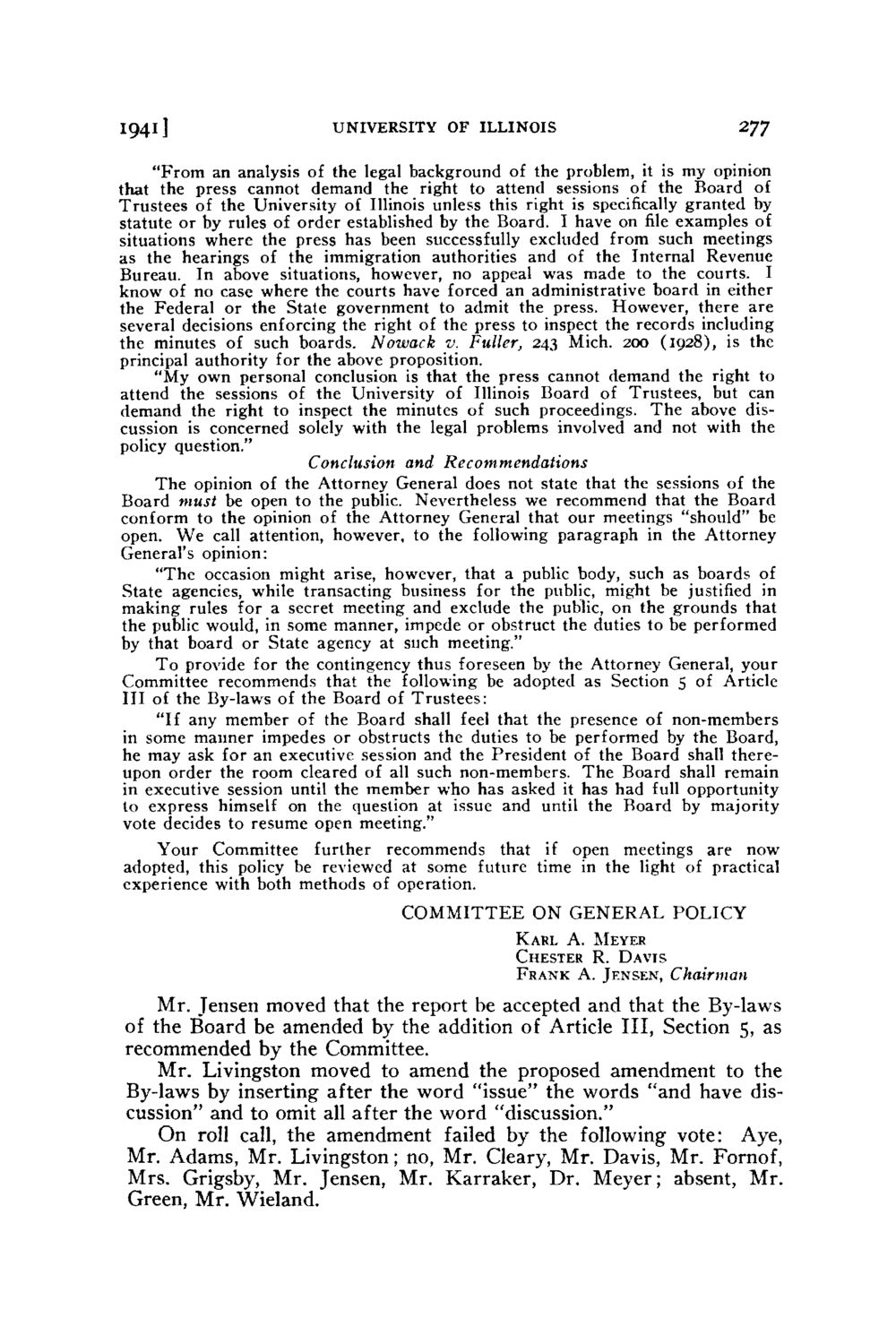| |
| |
Caption: Board of Trustees Minutes - 1942
This is a reduced-resolution page image for fast online browsing.

EXTRACTED TEXT FROM PAGE:
1941] UNIVERSITY OF ILLINOIS 277 " F r o m an analysis of the legal background of the problem, it is my opinion that the press cannot demand the right to attend sessions of the Board of Trustees of the University of Illinois unless this right is specifically granted by statute or by rules of order established by the Board. I have on file examples of situations where the press has been successfully excluded from such meetings as the hearings of the immigration authorities and of the Internal Revenue Bureau. In above situations, however, no appeal was made to the courts. I know of no case where the courts have forced an administrative board in either the Federal or the State government to admit the press. However, there are several decisions enforcing the right of the press to inspect the records including the minutes of such boards. Nowack v. Fuller, 243 Mich. 200 (1928), is the principal authority for the above proposition. "My own personal conclusion is that the press cannot demand the right to attend the sessions of the University of Illinois Board of Trustees, but can demand the right to inspect the minutes of such proceedings. T h e above discussion is concerned solely with the legal problems involved and not with the policy question." Conclusion and Recommendations T h e opinion of the Attorney General does not state that the sessions of the Board must be open to the public. Nevertheless we recommend that the Board conform to the opinion of the Attorney General that our meetings "should" be open. W e call attention, however, to the following paragraph in the Attorney General's opinion: " T h e occasion might arise, however, that a public body, such as boards of State agencies, while transacting business for the public, might be justified in making rules for a secret meeting and exclude the public, on the grounds that the public would, in some manner, impede or obstruct the duties to be performed by that board or State agency at such meeting." T o provide for the contingency thus foreseen by the Attorney General, your Committee recommends that the following be adopted as Section 5 of Article I I I of the By-laws of the Board of T r u s t e e s : "If any member of the Board shall feel that the presence of non-members in some manner impedes or obstructs the duties to be performed by the Board, he may ask for an executive session and the President of the Board shall thereupon order the room cleared of all such non-members. T h e Board shall remain in executive session until the member who has asked it has had full opportunity to express himself on the question at issue and until the Board by majority vote decides to resume open meeting." Your Committee further recommends that if open meetings are now adopted, this policy be reviewed at some future time in the light of practical experience with both methods of operation. COMMITTEE ON GENERAL POLICY KARL A. MEYER CHESTER R. D A V I S F R A N K A. JENSEN, Chairman Mr. Jensen moved that the report be accepted and that the By-laws of the Board be amended by the addition of Article III, Section 5, as recommended by the Committee. Mr. Livingston moved to amend the proposed amendment to the By-laws by inserting after the word "issue" the words "and have discussion" and to omit all after the word "discussion." On roll call, the amendment failed by the following vote: Aye, Mr. Adams, Mr. Livingston; no, Mr. Cleary, Mr. Davis, Mr. Fornof, Mrs. Grigsby, Mr. Jensen, Mr. Karraker, Dr. Meyer; absent, Mr. Green, Mr. Wieland.
| |